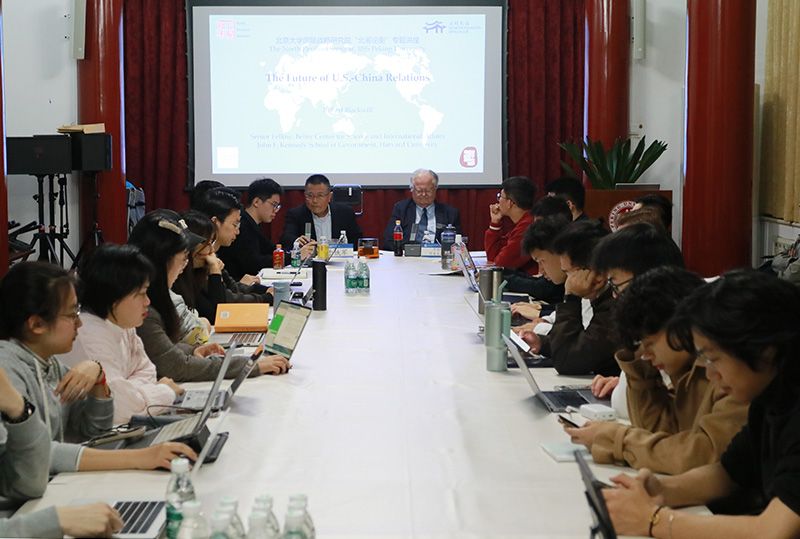On the evening of October 27, 2025, the Institute of International and Strategic Studies (IISS), Peking University (PKU) successfully held the 92nd session of its North Pavilion Seminar lecture series, titled “The Future of U.S.-China Relations”. The lecture was delivered by Robert Blackwill, former U.S. Ambassador to India and Distinguished Visiting Fellow at the Hoover Institution, Stanford University. The session was chaired by Professor Yu Tiejun, President of IISS, PKU, and attended by more than 30 faculty members and students from both inside and outside PKU.

At the beginning of the lecture, Blackwill recalled his early experience of accompanying Dr. Henry Kissinger‘s visit to China, noting that he had witnessed China’s tremendous transformation over the past five decades. Unfortunately, China–U.S. relations are now at their lowest point since the establishment of diplomatic ties, with the two countries struggling to reach consensus on almost every major international issue. One key source of their disagreement lies in the postwar international order designed under Western leadership. While China seeks to promote reforms that better reflect the interests and perspectives of developing countries, the United States and other Western nations aim to preserve the existing order — leaving many multilateral institutions paralyzed by confrontation and pushing the global order toward growing instability.
Blackwill voiced that neither the Chinese nor the U.S. leadership wants a war between the two countries, and both share the responsibility to manage competition properly and explore ways for peaceful coexistence. He noted that the “enemy/friend” dichotomy cannot accurately capture the complexity of China-U.S. relations, and that economic interdependence between the two makes “decoupling” unrealistic. Blackwill expressed confidence in the upcoming summit between the two leaders in South Korea, hoping it would produce positive outcomes. He cautioned, however, that if the two countries fail to manage their differences through diplomacy and compromise, the potential for future conflict will only grow.
On the future of China–U.S. relations, Blackwill suggested holding regular meetings between the two countries’ leaders to strengthen mutual understanding, upholding the principles of the Shanghai Communiqué to stabilize bilateral ties, easing trade and economic frictions through negotiation, and promoting deeper people-to-people and youth exchanges. Blackwill also shared his personal experiences and career path with the students, encouraging the younger generation to pursue what they love, build a solid foundation, and work diligently toward their goals.
During the discussion session, Blackwill engaged in in-depth exchanges with faculty and students on topics such as geopolitical hot spots in Northeast Asia, India–U.S. relations, and China–U.S. people-to-people and cultural exchanges. (Contributed by Fan Jiayuan)
Editor: Li Fangqi Photographer: Zheng Huaizhou

